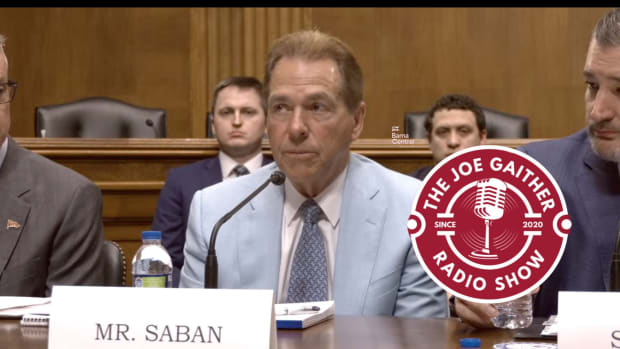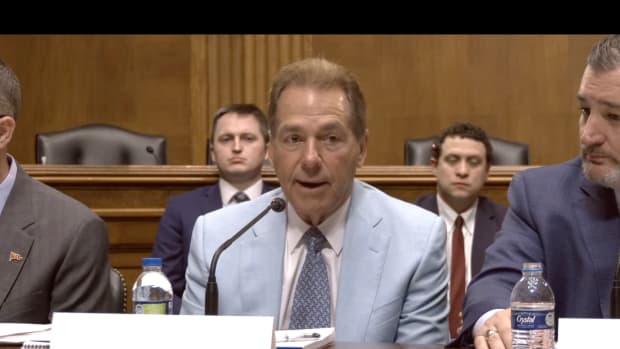Crimson Corner: Is CFP Expansion Really the Answer?
If you're a follower of college football, then you've likely heard all of the narratives surrounding the potential expansion of the College Football Playoff field of teams. Since the summer when the CFP board of managers began to look into the possibility of expanding the playoff from its current four-team format into either eight or 12 teams, conversation on the topic has been constant throughout the 2021 season.
On one side of the discourse, you have those that are in support of it. More teams means more opportunity for those that have been on the outside looking in in previous years to have a greater chance at winning a national title. Additionally, more teams means more games, and who doesn't want that?
On the opposite side of the aisle, you have those that are against expansion. To them, not only is player safety a concern, but also the belief that expansion would just delay the inevitable: a blue blood team taking care of business and winning it all.
There's certainly valid points to be made for both sides of the discussion. However, the 2021 season ultimately gave the skeptics some additional ammunition for their argument.
After all of the ongoing discussion this year about expansion, the same thing that many predicted would happen occurred: a CFP semifinal that was dominated by two blue-blood programs in Alabama and Georgia. However, the storyline doesn't revolve around the Crimson Tide and the Bulldogs dominating their opponents. Rather, the primary topic of conversation has been in the steep drop-off between the top four teams and the rest of the college football field.
Take a look at the top 12 teams that, if the CFP had been expanded, would have all made the playoffs this season:
2021 CFP Top 12 Teams
1. Alabama 12-1
2. Michigan 12-1
3. Georgia 12-1
4. Cincinnati 13-0
5. Notre Dame 11-1
6. Ohio State 10-2
7. Baylor 11-2
8. Ole Miss 10-2
9. Oklahoma State 11-2
10. Michigan State 10-2
11. Utah 10-3
12. Pittsburgh 11-2
Now, who among you would predict that any of the teams ranked between 5-12 would take down any of the top four teams? Sure, each of the 5-12 teams would be awarded with an extra game to play in the CFP, and there would certainly be years with upsets, but more often than not, those same top four teams would crush their competition.
In the projected playoff format, you would have Notre Dame-Pitt, Ohio State-Utah, Baylor-Michigan State and Ole Miss-Oklahoma State as the first round, with the top four teams having a bye. In the second round, you would have the winners of those four games playing the top four teams.
In what world would any of those bottom eight teams be favored after the top four not only had a bye week to prepare, but also already have put forth a much better regular-season resume?
Earlier this week, Alabama coach Nick Saban addressed the possibility of expansion. While it wasn't anything different than what he's said before on the matter, he double-down on an expanded CFP taking away meaning from the bowl games.
"The more we expand the playoffs, the more we minimize bowl games, the importance of bowl games, which I said when we went to four," Saban said. "So I don't think that's changed. And I think it's also come to fruition."
And he's absolutely right. The CFP has already taken away meaning from many of the bowl games. Sure, for teams that go 6-6 or teams have that unusually successful seasons, a bowl game can still be seen as a reward for a solid season. However, for the blue-blood programs, they're seen as nothing but a compensation prize by both the team and the players, no matter how much positive rhetoric the teams' head coaches and players spew out ahead of the game.
Do you really think Clemson head coach Dabo Swinney was excited to play in the Cheez-It Bowl?
An expanded CFP would not only take away the meaning of bowl season, but also remove popular bowl matchups entirely. It would take away any sense of purpose, with all of the top-12 teams playing in the CFP and rendering the bowls of any excitement or top matchups.
Another topic of conversation has been the age-old point of 'Well, if there's expansion, then there will no longer be questions surrounding who's left out each year.' That argument is simply untrue. Since the CFP's inception, there has been conversation and debate about who is ranked No. 4 and who is ranked No. 5, with justifications for both sides as to why 'Team X' and 'Team Y' should have been reversed or why 'Team X' truly deserved to go.
It's an old argument, and it won't be solved with expansion. Rather, the conversation will now shift down in the rankings to who makes it between No. 12 and No. 13. The only way to ever stop that discussion would be to have all 130 FBS teams in the playoff, which obviously can't happen.
At the end of the day, expansion wouldn't solve any problems. It would simply shift the debate to a different set of teams, and ultimately the same blue-blood programs would continue their success. Sure, more teams would be able to say that they made the CFP, but how many would actually advance past the first or second rounds?
More often than not, it would still be the same four teams that finished in the top four of the rankings. While the seasons that featured upsets would certainly be exciting, early exits would be the primary storyline for teams 5-12 more often than not.




